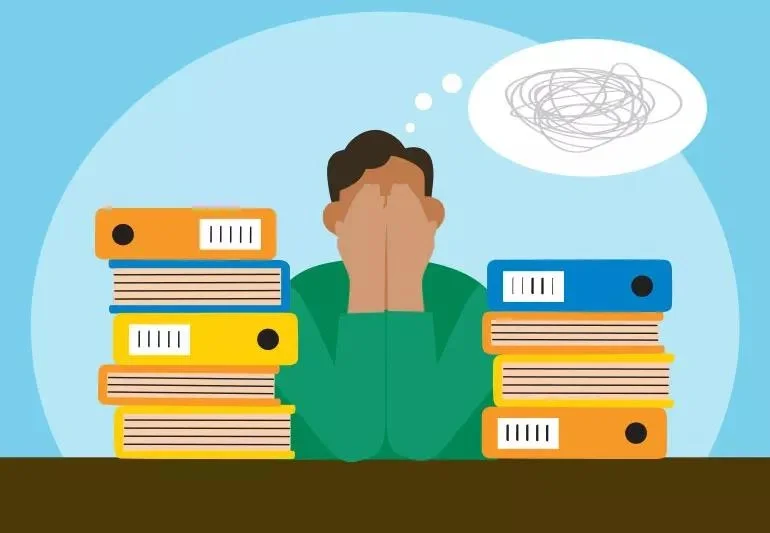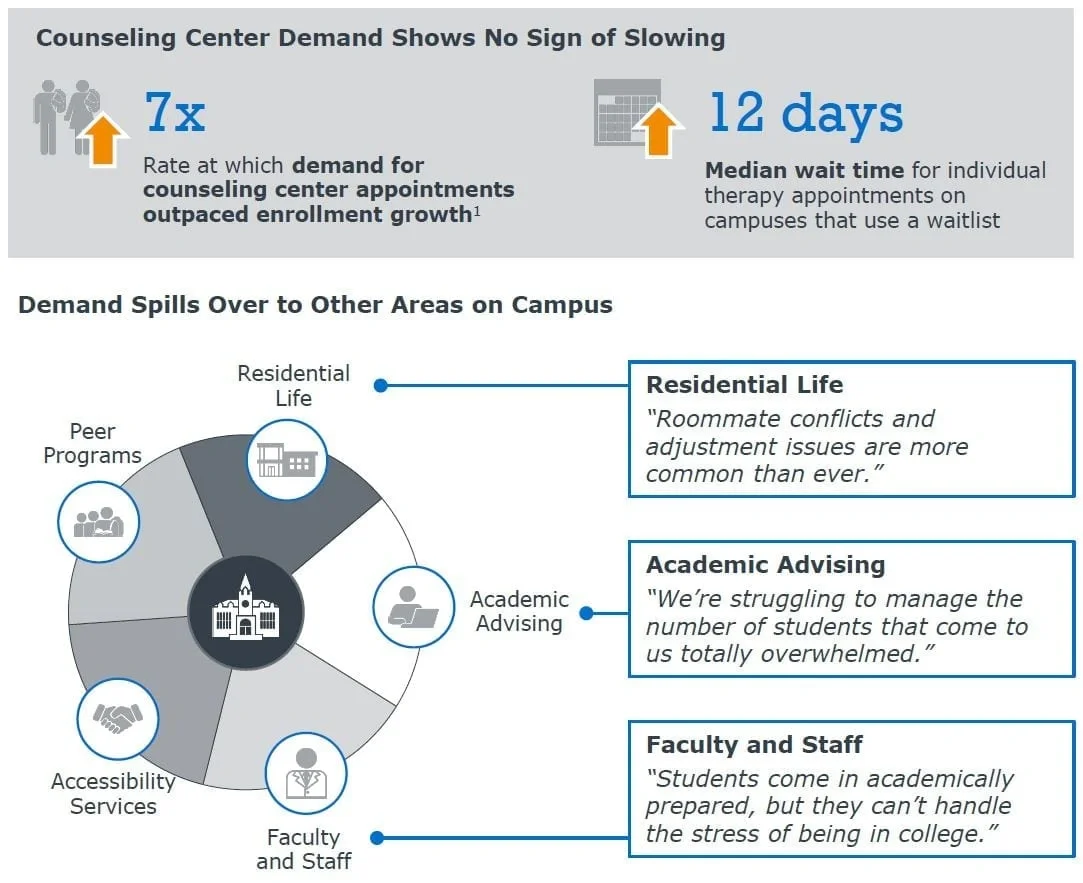University Mental Health Crisis: What Student Should Know [2025 Guide]
College students face significant mental health challenges today. Recent studies show that mental health problems affect more than 60% of students across U.S. campuses. The University of Richmond has seen a sharp rise in students who reach out to CAPS (Counseling and Psychological Services). The numbers paint a clear picture - student visits have surged from 20% to 60% over the last several years.
CAPS now helps about 850 Richmond students each year, with anxiety and academic stress emerging as the main reasons students ask for support. The reality of mental health in college students demands our attention. Sadly, suicide ranks as the second most common cause of death among college students. U.S. campuses report roughly 1,100 suicides annually. Students often struggle to balance academics, social life, and personal challenges. The constant pressure to excel in everything takes its toll, resulting in chronic stress, poor sleep, and feelings of being alone.
This piece offers a complete look at mental health resources available to Richmond students. You'll learn how to access these essential services and discover ways to support your own wellbeing and your peers' throughout your college years.
Understanding the Mental Health Crisis on Campus
Mental health issues at universities have reached worrying levels. The 2019 National College Health Assessment revealed that almost 70% of students felt "overwhelming anxiety" during the previous year, and more than half struggled with severe depression [1]. The number of students who thought about suicide jumped to 16% from 10% in 2013 [1].
Rising rates of anxiety and depression
Recent data shows a troubling picture of student mental health. The 2021-2022 Healthy Minds Study, which looked at 96,000 students from 133 campuses, found that 44% showed signs of depression. Another 37% reported anxiety disorders, while 15% had serious thoughts about suicide last year. These numbers are the highest ever recorded in the survey's 15-year history [2]. Research also shows that LGBTQIA+ students are three times more likely to report depression than their straight, cisgender classmates [3].
Why college students are more vulnerable
Students face unique challenges that put their mental health at risk. The timing plays a crucial role - about 70% of mental disorders first show up during the teen years and early adulthood [1]. Students deal with these issues while leaving home and their support systems behind.
Students at highest risk for depression and anxiety include:
Female students
Low-income students
Students of color
Student caregivers
LGBTQ+ students [4]
Poor sleep habits, irregular meals, and substance abuse make things worse. These common campus issues often go hand in hand with mental illness [1].
The impact of academic and social pressure
Research links academic pressure to mental health problems like depression, anxiety, self-harm, and suicidal thoughts [5]. Students struggle to balance tough coursework, activities outside class, and part-time jobs. As a result, 41% of students find it "difficult" or "very difficult" to stay enrolled [6].
The numbers tell a clear story - 44% of associate degree students and 36% of bachelor's degree students think about taking at least one term off [6]. When asked about their reasons, 69% of bachelor's degree students and 55% of community college students point to emotional stress as the main factor [7].
This crisis means more than just numbers on a page. It represents thousands of students whose grades, friendships, and future opportunities suffer because they can't get the mental health help they need.
Key Mental Health Services at Richmond
The University of Richmond provides several key mental health services to help students handle challenges they might face during their college years.
CAPS: Counseling and Psychological Services
CAPS helps around 850 Richmond students each year [8]. Students ask for help mainly because of anxiety and academic stress. You'll find CAPS on the 3rd floor of the Well-Being Center (363 College Road). It's open Monday through Friday from 8:30 a.m. to 4:30 p.m. Over one-third of Richmond students visit CAPS at least once before they graduate [8]. CAPS limits appointments to bi-weekly sessions with a maximum of eight visits before referring students to off-campus care [8]. They also run special group programs that focus on stress management, grief, and family relationships [8].
TimelyCare: 24/7 telehealth support
Richmond's partnership with TimelyCare gives free virtual mental health services to all CAPS-eligible students [9]. This service helps fill important gaps by providing:
24/7 on-demand emotional support through TalkNow with wait times under 4 minutes [10]
Scheduled counseling with providers you choose (usually available within 2 days) [10]
Support anywhere in the United States through your smartphone or web-enabled device [9]
Students with severe symptoms show real improvement by their third scheduled counseling session [11].
Crisis intervention and emergency contacts
Students facing mental health emergencies during academic year open hours should call or walk in to CAPS directly (804-289-8119). Email won't work for crisis situations [9]. During summer or after hours, students should call University Police at (804) 289-8911, dial 911, or go to the nearest emergency room [9]. Dr. Rachel Turk also helps student-athletes with both mental health and sports performance needs [12].
Meditation and prayer rooms on campus
Richmond's dedicated spaces for reflection, meditation, and prayer give students quiet spots to center themselves away from academic pressure. These rooms are technology-free zones. Research shows mindfulness activities help reduce anxiety and depression symptoms [13]. About 9.3 million Americans use meditation mainly to improve their mental health [13].
Specialized Programs and Workshops
Richmond goes beyond simple counseling services and provides specialized mental health programs to help students with different needs.
Mental health workshops for college students
Richmond's skill-building workshops help students tackle common challenges they face. These free, well-laid-out sessions help students manage anxiety, cope with depression, and support those with ADHD. Unlike regular therapy, these workshops follow a quick 3-session model that gives students time to practice between meetings. Students can choose to participate at their own comfort level when it comes to sharing personal experiences.
Group therapy and skill-building sessions
Research shows that group therapy works well, especially when you have relationship issues that often lead to anxiety and depression. These interpersonal groups usually have 5-8 members with one or two trained therapists. Groups have no session limits, unlike individual therapy, which makes them perfect for long-term goals. Students might feel nervous about joining at first, but these feelings often show why group therapy could help them the most.
Wellness programs and fitness initiatives
Campus wellness programs include physical activity, mindfulness practices, and ways to reduce stress. Student participation in these programs has grown by 40% in the last five years [4], which suggests more students understand their value. Regular mindfulness activities help reduce anxiety and depression symptoms among students who take part.
Support for LGBTQ+ and minority students
Richmond provides dedicated resources for LGBTQ+ students because they face unique mental health challenges. Studies show that LGBTQ+ youth tend to prefer accessing specialized organizations for support [2]. The most helpful services include identity affirmation, chances to connect with peers, and access to therapists who understand LGBTQ+ specific needs.
How to Access and Navigate Support Systems
Getting help through university mental health services might feel daunting, but Richmond makes the support process simple once you know what's available.
How to schedule a CAPS appointment
Students can reach CAPS by calling 330-672-2487 during business hours. The staff will ask about your needs to match you with the right care [3]. Your first visit usually takes about 45 minutes [14]. Peak times during the semester may mean longer waits, but crisis support is always ready whatever your appointment history [3].
Using TimelyCare from your device
TimelyCare gives you virtual support 24/7 through these simple steps:
Head to timelycare.com or grab the TimelyCare app
Sign in with your Richmond credentials
Hit "Get Care" and pick either TalkNow (quick help with ~4 minute wait) or Scheduled Counseling (usually available within 2 days) [10]
Students often use TimelyCare services at night or on weekends when campus facilities are closed [10]. You can choose providers based on their expertise, gender, or race to get tailored support [10].
Understanding your health insurance options
Campus counseling gives you free sessions up to a certain number of visits [15]. Richmond's student insurance usually covers off-campus care if needed. Harvard also provides TimelyCare at no cost among other coverage choices [16].
What to do if you're worried about a friend
Someone you know needs help? Here's what you can do:
Help them connect with CAPS or TimelyCare
In urgent situations, call 988 for 24/7 support [17]
Talk to a trusted professor or resident advisor [17]
Conclusion
Mental health challenges affect most college students, and Richmond's campus mirrors this nationwide crisis. Students deal with unprecedented levels of anxiety, depression, and academic stress during what should be their most formative years. Of course, the numbers tell a worrying story – but they also show an important truth: you're not alone in what you're going through.
Richmond has stepped up by making vital resources more accessible. CAPS now helps hundreds of students each year, while TimelyCare gives you 24/7 support whatever your location. On top of that, specialized workshops, group therapy sessions, and wellness programs are a great way to get help for specific challenges you might face.
Getting help shows strength, not weakness. Students who use these resources often see most important improvements, sometimes after just a few sessions. We need to work together to break down the stigma around mental health support.
Your college journey has tough moments. But with the right support, these challenges become manageable instead of overwhelming. Richmond gives you several ways to improve your mental health, from crisis intervention to ongoing therapy.
Keep an eye on your friends too. A simple conversation could mean everything to someone who's struggling quietly. Creating a supportive campus community needs everyone to play their part.
College years bring unique pressures, but they also give you unprecedented access to mental health resources. You have all the tools you need to stay well – you just need to reach out. Your mental health is nowhere near less important than your academic success.
Key Takeaways
Understanding the mental health crisis at Richmond and knowing how to access support can be life-changing for students navigating college pressures.
• Mental health struggles are widespread: Over 60% of college students experience mental health issues, with Richmond's CAPS usage jumping from 20% to 60% of students in recent years.
• Multiple support options are available: CAPS offers in-person counseling (8 sessions max), while TimelyCare provides free 24/7 virtual support with average 4-minute wait times.
• Crisis help is always accessible: Call CAPS at 804-289-8119 during hours, University Police at 804-289-8911 after hours, or 988 for immediate crisis support anytime.
• Specialized programs address diverse needs: Group therapy, LGBTQ+ support, mental health workshops, and wellness programs provide targeted help beyond basic counseling.
• Early intervention improves outcomes: Students using TimelyCare show clinically significant improvement by their third session, emphasizing the importance of seeking help promptly.
Taking advantage of these resources represents strength, not weakness. Whether you're struggling with anxiety, depression, or academic stress, Richmond's comprehensive mental health services are designed to help you succeed both academically and personally throughout your college journey.
FAQs
Q1. What mental health services are available to University of Richmond students?
The University of Richmond offers several mental health services, including CAPS (Counseling and Psychological Services) for in-person counseling, TimelyCare for 24/7 virtual support, crisis intervention services, and specialized programs like group therapy and wellness workshops.
Q2. How can I schedule an appointment with CAPS at the University of Richmond?
To schedule an appointment with CAPS, call 804-289-8119 during business hours (Monday to Friday, 8:30 a.m. to 4:30 p.m.). First-time appointments typically involve a 45-minute consultation, but wait times may be longer during peak academic periods.
Q3. What should I do if I'm experiencing a mental health crisis outside of CAPS operating hours?
For mental health emergencies outside of CAPS hours, contact University Police at 804-289-8911, call 911, or go to the nearest emergency room. You can also use TimelyCare for 24/7 virtual support or call the national crisis hotline at 988.
Q4. Are there any specialized mental health programs for LGBTQ+ students at Richmond?
Yes, the University of Richmond offers dedicated resources and support for LGBTQ+ students, recognizing their particular vulnerability to mental health challenges. These services include affirmation of identity, peer connection opportunities, and access to clinicians trained in LGBTQ+ specific concerns.
Q5. How effective are the mental health services provided by the university?
The mental health services at Richmond have shown positive results. For instance, students using TimelyCare have demonstrated clinically significant improvement by their third scheduled counseling visit. Additionally, participation in wellness programs has increased by 40% over the past five years, indicating growing awareness and effectiveness of these services.
References
[1] - https://academicmatters.ca/inside-the-mental-health-crisis-facing-college-and-university-students/
[2] - https://pmc.ncbi.nlm.nih.gov/articles/PMC8654681/
[3] - https://www.kent.edu/caps/scheduling-appointment
[4] - https://www.utoledo.edu/sustainability/un-sustainable-development-goals/health-well-being.html
[5] - https://www.sciencedirect.com/science/article/pii/S0165032723008510
[6] - https://health.clevelandclinic.org/mental-health-in-college-students
[7] - https://www.nea.org/nea-today/all-news-articles/mental-health-crisis-college-campuses
[8] - https://www.thecollegianur.com/article/2023/09/academic-stress-among-leading-reason-students-are-seeking-mental-health-support
[9] - https://caps.richmond.edu/
[10] - https://timelycare.com/mental-health/
[11] - https://timelycare.com/
[12] - https://richmondspiders.com/sports/2020/4/27/mental-health-resources.aspx
[13] - https://crln.acrl.org/index.php/crlnews/article/view/17784/19602
[14] - https://healthcenter.indiana.edu/counseling/index.html
[15] - https://jedfoundation.org/resource/finding-mental-health-help-as-a-college-student/
[16] - https://hushp.harvard.edu/your-benefits/mental-health-coverage/
[17] - https://www.thementalhealthcoalition.org/college-mental-health-toolkit/




